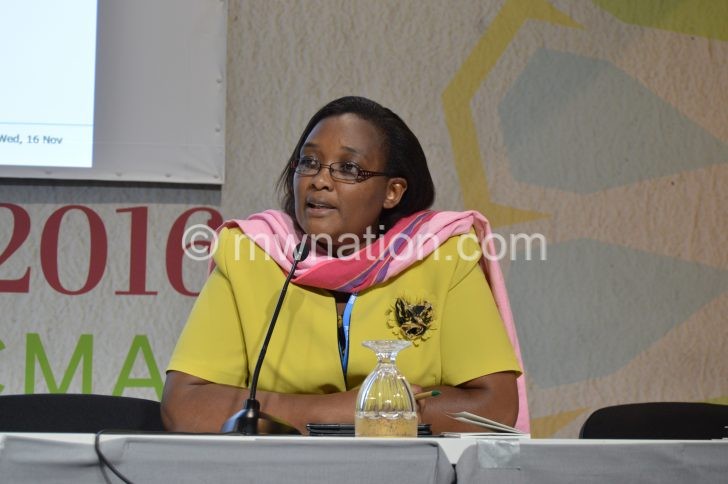Malawi shares climate smart agriculture best practices in Morocco
Malawi was the centre of attraction on Wednesday evening at the United Nations Framework Convention on Climate Change in Marrakech, Morocco as it shared climate smart agriculture (CSA) best practices.
The side event panel discussion was aimed at deepening the understanding of how to improve the livelihoods of smallholder farmers in the face of negative climate change, demonstrate what countries are doing to support climate resilience and present some of the challenges smallholder farmers face. Other countries that were part of the panel discussion were Zambia, Tanzania and Zimbabwe.

Deputy Director in the Department of Land Resources Conservation in the Ministry of Agriculture, Gertrude Kambauwa while presenting at the official COP22 Side Event, entitled “How are East and Southern Africa equipping farmers to deal with the impact of Climate Change” explained to the delegates how the agriculture sector in Malawi is adversely impacted by climate change.
The Side Event was co-hosted by the Government of Zimbabwe and the Southern African Confederation of Agricultural Unions (SACAU). The Government of Malawi shared an in-depth panel discussion on Climate Smart Agriculture with the governments of Tanzania, Zambia and Zimbabwe, and moderated by Vuna: a DFID-funded programme, implemented by Adam Smith International working with the aforementioned countries to promote Climate Smart Agriculture in the region.
Kambauwa also explained how the Government in collaboration with its partners – both the Development Partners as well as local stakeholders recognize that there is an urgent need to address the impacts that climate change has on agriculture and the livelihoods of the small holder farmers who are adversely impacted.
“Findings from a study carried out recently in Malawi show that it is more profitable to adopt CSA practices than to use conventional practices (cost is higher but benefits outweigh the difference in costs) such that the Ministry of Agriculture is encouraging farmers to adopt CSA interventions.
“Advances have already been registered in policy, knowledge management and field level implementation and options (technical, technological and institutions). There is therefore need to ensure that there is strong coordination to advance CSA in Malawi. This is because there is need to ensure that the messages on CSA going out to the users from the various implementers are harmonized in order to avoid confusion because the harmonized messages are based on successful, proven and scalable CSA interventions which have shown to have potential to bring the intended benefits of building resilience to the farming systems,” explained Kambauwa.
When asked to share lessons about how to make coordination work well in CSA, Kambauwa stated that it is important to identify and establish a platform at which all stakeholders implementing or advancing CSA meet on a regular basis.
“This structure should also be decentralized as much as possible so that there is participation from the local to the national levels. The platform should be used to share experiences in implementation – share progress, challenges encountered, solutions to address the challenges and agree on the way forward,” she said.
The side event panel discussion was hosted by Zimbabwe.





